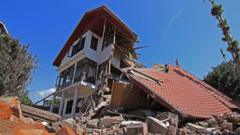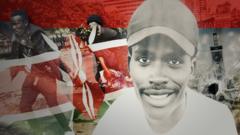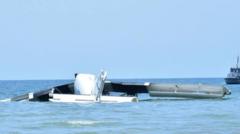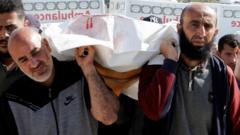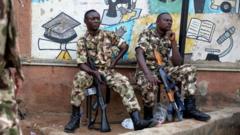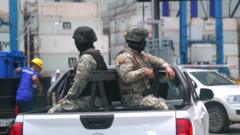The recent surge in violence against Colombian security forces highlights the challenges facing the government in its efforts to establish peace amid ongoing conflicts with criminal organizations.
Escalating Violence in Colombia: 27 Security Forces Killed in Two Weeks
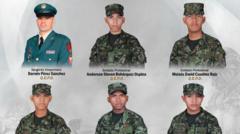
Escalating Violence in Colombia: 27 Security Forces Killed in Two Weeks
Targeted strikes by armed groups intensify against the Colombian military and police.
In a grim turn of events, Colombia has witnessed a significant increase in targeted attacks on its security forces, resulting in the deaths of 27 individuals, including 15 police officers and 12 soldiers, over the past two weeks. The government attributes this wave of violence to armed groups, particularly the notorious Gulf Clan, as a reaction to the recent killings of their leaders.
President Gustavo Petro has publicly condemned these attacks, stating they serve as acts of retaliation against his administration’s efforts to neutralize criminal activity. In light of the rising death toll, the government has announced a reward for any information leading to the arrest of those responsible for the ambushes.
Despite the promises made during his campaign to achieve "total peace," President Petro's interior minister acknowledged the difficult reality, admitting the current peace strategy is struggling. In a post on social media platform X, Petro detailed a list of those killed, noting that many police officers were attacked while on duty, while others were targeted outside of their professional duties. A particularly brutal ambush on Sunday in Guaviare province resulted in the deaths of seven soldiers, and authorities have blamed this assault on a dissident faction of the Revolutionary Armed Forces of Colombia (Farc).
In 2016, the Farc signed a landmark peace deal with the Colombian government, leading to the disarmament of the majority of its fighters. However, numerous dissenters did not accept the agreement and have continued to engage in violence against state forces. In response, Petro’s government had initiated dialogues with both dissident groups and the Gulf Clan, but many of these negotiations recently fell through. In January, he suspended talks with the National Liberation Army (ELN), citing a lack of commitment to peace. Additionally, a police operation against Gulf Clan figures earlier this year has further strained relations and ushered in a dangerous new phase of violence.
Colombia’s security situation remains critical, as authorities grapple with the implications of this escalating conflict on civilian safety and widespread stability throughout the country.
President Gustavo Petro has publicly condemned these attacks, stating they serve as acts of retaliation against his administration’s efforts to neutralize criminal activity. In light of the rising death toll, the government has announced a reward for any information leading to the arrest of those responsible for the ambushes.
Despite the promises made during his campaign to achieve "total peace," President Petro's interior minister acknowledged the difficult reality, admitting the current peace strategy is struggling. In a post on social media platform X, Petro detailed a list of those killed, noting that many police officers were attacked while on duty, while others were targeted outside of their professional duties. A particularly brutal ambush on Sunday in Guaviare province resulted in the deaths of seven soldiers, and authorities have blamed this assault on a dissident faction of the Revolutionary Armed Forces of Colombia (Farc).
In 2016, the Farc signed a landmark peace deal with the Colombian government, leading to the disarmament of the majority of its fighters. However, numerous dissenters did not accept the agreement and have continued to engage in violence against state forces. In response, Petro’s government had initiated dialogues with both dissident groups and the Gulf Clan, but many of these negotiations recently fell through. In January, he suspended talks with the National Liberation Army (ELN), citing a lack of commitment to peace. Additionally, a police operation against Gulf Clan figures earlier this year has further strained relations and ushered in a dangerous new phase of violence.
Colombia’s security situation remains critical, as authorities grapple with the implications of this escalating conflict on civilian safety and widespread stability throughout the country.


